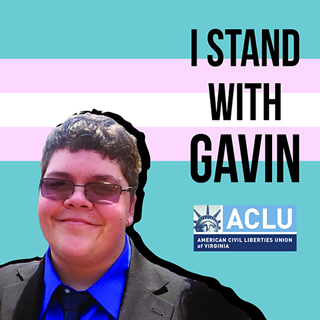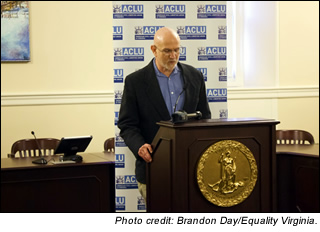News & Commentary
Jan 31, 2016
ACLU-VA Joins with Coalition to Fight Blatantly Discriminatory SB40
The ACLU of Virginia and three other prominent civil rights organizations have joined in a strongly-worded letter to state Sen. Mark D. Obenshain (R-Harrisonburg), chair of the Senate Courts of Justice Committee, urging opposition to Senate Bill 40."If passed, this bill would allow all clerks and deputy clerks in the commonwealth to refuse to issue a marriage license to any couple if the clerk objects to the marriage based on 'personal, ethical, moral, or religious grounds,'" according to the letter, signed by ACLU-VA Executive Director Claire Guthrie Gastañaga, Americans United for Separation of Church and State State Legislative Counsel Amrita Singh, Anti-Defamation League Associate Regional Director Eric M. Wachter, and Jewish Community Relations Counsel of Greater Washington Director of Virginia Government Relations Darcy Hirsch.The letter continues: "If this legislation is passed and signed into law, clerks would believe that they could refuse to issue marriage licenses because they do not approve of marriage for couples who are interfaith, interracial, same sex, or divorcees. Government officials—funded with taxpayer dollars—should not be allowed to pick and choose which of their duties they will fulfill or which services they will provide and to whom, especially when the result would be blatant discrimination and the service to be denied involves a fundamental human right."Fundamental reasons why SB 40, sponsored by Sen. Bill Carrico (R-Grayson) should be defeated are:
Jan 27, 2016
Gavin Grimm Statement Regarding School Sex Discrimination Lawsuit
Following is a prepared statement that Gloucester High School student Gavin Grimm delivered at a news conference today with his attorneys from the ACLU of Virginia and ACLU national. The conference was held immediately following oral arguments before the U.S. Court of Appeals for the Fourth District in Gavin's sex discrimination case against his local school board. Watch the entire news conference below."Standing at the school board meeting last year was equal parts humiliating and terrifying."Humiliating because, at age 15, I had to witness adults of my community discuss in a public forum some rather intimate details of my anatomy. In plainer words, the anatomy of a 15-year-old was considered appropriate for public conversation by the Gloucester County School Board."For any kid that would be mortifying. However for a kid who is transgender, bringing to the forefront of people’s minds the very part of themselves that already makes them dysphoric is incomparably distressing."I sat by while people repeatedly called me a girl. "She." "Her." "Young lady." "Confused young lady." Even "freak." Bullying is already an enormous problem for high school aged youth, and especially transgender youth. To hear adults of my community treat me as if I was a creature for their ridicule and observation, or some oddity on a stage was incredibly dehumanizing to an extent I could not possibly convey."And of course, I was terrified. Firstly, because the school board had the power to bar me from the correct restroom for the rest of my time at Gloucester High School. Secondly, because I was in a room full of adults who thought it appropriate to have this sort of vulgar discussion, who would clap or cheer after every derogatory statement, of which there were many."After enduring all of that – twice – I felt as though I couldn't possibly take any more hits. But I did, because at the end of the school board meetings, my school board chose to enact a policy that would further alienate and stigmatize me by forcing me to use separate restrooms from all of the other students at school. For me, the thought of going into a separate restroom which might as well have been labeled "other" was just far too much to bear. The trek to the restroom in the nurse’s office each time it was necessary was similarly humiliating, similarly upsetting and othering and dysphoria-inducing. The only difference was that it was just slightly less conspicuous."I am fighting this fight because no kid should have to think so hard about performing a basic and private function of being alive. No kid struggling to be accepted, and struggling to accept themselves, should have to simultaneously battle for the right to use the correct bathroom. That is why I have come to this point. I hope that I will be one of the last kids that has to go through something like this, and I am going to do what I can to ensure that."

Jan 25, 2016
Anti-LGBT Laws Would Dial Back Progress in Public Schools
Note: This is the first in a five-part series featuring Virginians whose rights would be directly affected by anti-LGBT bills now under consideration in the state legislature. All writers participated in a joint news conference held by the ACLU of Virginia and Equality Virginia at the Virginia Capitol on Jan. 19, 2016.By Robert Rigby Fairfax County Public Schools (FCPS) PrideI have been a teacher in the Fairfax County Public Schools district for the past 17 years. I represent a new employees’ group, “FCPS Pride.”After many years of efforts, Fairfax County updated its non-discrimination policies during the past school year to include sexual orientation and gender identity. As a result, we were able to organize as a certified employees’ group, to include lesbian, gay, bisexual and transgender staff of FCPS. We are teachers, administrators and sponsors of student clubs; we have been joined by parents of LGBT students in Fairfax, and community members.FCPS Pride was disappointed but not surprised by Del. Bob Marshall’s (R-Manassas) House Bill 385, which would prohibit school boards and state agencies from passing inclusive non-discrimination policies, which protect LGBT staff, families and students.Members of the LGBT community of staff in Fairfax, my community, have spoken of the acceptance we sense in our schools as a result of the passage of the inclusive policies. I and others feel more secure in our employment than we ever have. New teachers talked about coming to Fairfax in part because it is a welcoming employer. Marshall’s bill would dial this all back; he would take away our sense of security and inclusion.These bills will affect the ability of public schools to attract employees and families, and will also impact colleges and universities in bringing in professors and students. It will make Virginia a less attractive place to live and work. As for Del. Mark Cole’s (R-Fredericksburg) bills to limit and penalize bathroom use based on “anatomical gender” (HB 663 and 781), our response is one of disbelief and anger.Cole says that he expects his proposal to be enforced by facilities users. I imagine suspicion of students, staff and visitors, perhaps resulting in accusations, and some sort of hearings and assessment of a person’s gender.As teachers we wonder whether we would be called upon to enforce this law; if a student or a visitor brings a complaint to me, do I refer it to my assistant principal, do I contact our School resource officer? Will I need to defend myself if someone brings a complaint against me? It brings in worry and anxiety not only to transgender stakeholders in our schools, but to anyone who may not meet some “user’s” concept of masculinity or femininity.What he calls “common sense” legislation in fact ramps of the rhetoric around these concerns, and increases fear in our schools.

Jan 21, 2016
Get a Warrant, Get Consent or Get Out
You may not realize this, but the government and corporations regularly access our personal, private information – and even that of our children – without our knowledge or consent, and on a daily basis. They use it for profit. They use it to track our location. That’s right—it’s hard to believe, but it’s true.These regular incursions into our privacy are made easier by the fact that our laws have failed to keep up with new technologies. As technology has advanced, our digital privacy laws remain stuck in the digital Dark Ages. This means that emails, text messages, location information and all of our digital data have been open to warrantless police surveillance.Virginia’s Sen. Chap Petersen (D-Fairfax) and Del. Mark Dudenhefer (R-Stafford), along with chief House co-patron Del. Rich Anderson (R-Woodbridge), have taken a critical step forward to ensure Virginians are no longer vulnerable to such government overreach. The Virginia Electronic Privacy Act (ECPA) would require law enforcement to obtain a warrant before accessing electronic information about our identities, where we go, who we know and what we do. This bill will provide reasonable privacy protections for our emails and other electronic information where federal law has failed to do so.Virginia residents should know that the government is working to protect their privacy, not violate it, and the majority of Americans across the country feel the same way. A 2014 study from the Pew Research Center found that that 75 percent of adults believe that their emails, text messages and location information are sensitive, and that 80 percent of adults feel Americans are rightly concerned about the government monitoring of Internet communications. Another recent poll found 90 percent of Americans want the next president of the United States to prioritize “protecting privacy so [Americans] have more control over our personal information.”Such widespread, nationwide support reinforces what we already know: Privacy issues transcend party lines. Republicans and Democrats, conservatives and progressives alike all want to be in control of their own privacy.Senator Petersen, Delegate Dudenhefer and Delegate Anderson join a diverse bipartisan coalition of elected officials and citizens from sixteen states and the District of Columbia who have come together to tell the nation they care about digital privacy and are willing to fight for it. The message from these states is clear: Where Congress is unwilling or unable to act to protect Americans’ privacy, or takes actions that are insufficient, the states are more than willing to step up and fill the void.Other states such as California, Colorado, Maine, Texas and Utah have already passed laws similar to Virginia’s ECPA. It doesn’t matter if you’re a blue or red state—people from all political stripes believe that using stealthy, secret or concealed technologies to access our data without our knowledge or consent is simply not an acceptable practice. Without a warrant, or our express permission, government simply shouldn’t be searching through our private information.The guiding principle for privacy in the United States in 2016 is the same as it was in 1776: “Get a warrant, get permission, or get out.”

Oct 16, 2015
Advocating for Virginia's Public School Students
The ACLU of Virginia recently sent the following letters to school divisions regarding important rights issues affecting students. -- Equality for LGBT Students:On October 8, 2015, the ACLU of Virginia sent a letter to all Virginia public school superintendents to raise awareness and bring attention to reports of harassment against students in Virginia schools who are, or are perceived to be, lesbian, gay, bisexual, or transgender (LGBT). In the letter, we remind superintendents of the district's legal responsibility to investigate every alleged case of bullying and to take appropriate actions to prevent bullying. -- Challenging Sex Discrimination in Schools:The ACLU of Virginia on October 13, 2015, sent a letter to the Chesterfield County School Board urging the school board to revise its dress code policy, which has ambiguous and vague language, and is administered in a way that disproportionately targets female students for violations. -- Free Expression in Schools:The ACLU of Virginia on October 13, 2015, sent a letter to Christiansburg High School regarding its prohibition on confederate flag emblems in the parking lot and on student clothing. We asked administrators for the rationale for their policies and urged them to review those policies to ensure that they do not infringe on students' rights to free expression.
Sep 30, 2015
Executions at any Cost
Virginia is nearing its first execution in three years. On Oct. 1, the Commonwealth is scheduled to execute Alfredo Prieto. If the execution of Mr. Prieto goes ahead as scheduled, the Commonwealth will show that the machinery of death trumps government transparency, accountability, and the U.S. Constitution.

Aug 25, 2015
Heading Back to School? Don't Forget Your Rights!
Every liberty remains a fight, every freedom a struggle. For students, understanding and embracing this struggle is crucial to preserving the victories of the past while continuing to win new freedoms and protections moving forward.

Aug 12, 2015
Our Chance to Bring Constitutional Policing to Fairfax County
This month is bookended by reminders of police abuse. Last Sunday marked one year since a police officer shot and killed Michael Brown in Ferguson, Missouri and August 29 will mark the two-year anniversary of a police shooting that occurred much closer to home – the shooting of John Geer by a Fairfax County police officer. In both cases, the men were unarmed. And, in both cases law enforcement and elected officials responded with an official wall of silence.In our society, we too often wait to consider and make needed reforms until after a horrible event triggers a public outcry. Ferguson and Fairfax County are sad examples of this reform model. As we wrote earlier this week, the police abuses in Ferguson triggered some positive reforms, including new restrictions placed on the transfer of military equipment from the federal government to state and local law enforcement. These were reforms for which we’d advocated previously, but which failed to gain traction until Ferguson made them impossible to ignore. Fairfax County is also a place where advocates have long sought police reforms. But, it took the inaction by the Fairfax County Policy Department (FCPD) in the wake of Mr. Greer’s death and federal concerns about how the investigation was handled for the Fairfax County Board of Supervisors to establish a commission to review the FCPD’s policies and practices and recommend changes to ensure a culture of public trust between the FCPD and the community. The high bar set to trigger reform opportunities makes it even more important that we push the commission to recommend real reforms now!The establishment of the police review commission in Fairfax, referred to officially as the Ad Hoc Police Practices Review Commission, is an important step in restoring civilian authority and oversight over policing in the County, a step that is also essential to restoring public trust in the FCPD. The commission is made up of a diverse group of stakeholders, including community advocates, law enforcement, and academics and will offer its recommendations to the Fairfax County Board of Supervisors this fall. The substance of these recommendations is still undecided. It’s up to us to ensure that they are rooted in the concepts and values of accountability, transparency, constitutional policing and respect for the sanctity of human life – otherwise we risk recommendations that merely rubber stamp the policies and practices that led us here in the first place.We can all make our voice heard in this process. You can check the Police Commission meeting schedule or the committee and subcommittee webpage to see when and where the commission and its subcommittees will meet and whether the agenda will include a public comment period where you can add your voice. The community’s input matters – your voice can make a difference.Not sure what to say? Here is what we’re asking the commission to recommend. Our recommendations are based on the belief that law enforcement officers are guardians of the Constitution.These recommendations include:

Stay Informed
Sign up to be the first to hear about how to take action.
By completing this form, I agree to receive occasional emails per the terms of the ACLU’s privacy statement.
By completing this form, I agree to receive occasional emails per the terms of the ACLU’s privacy statement.
